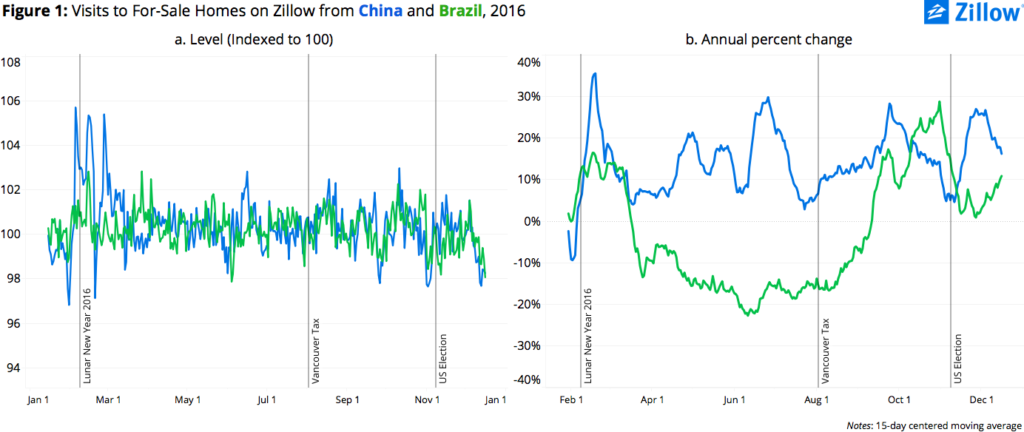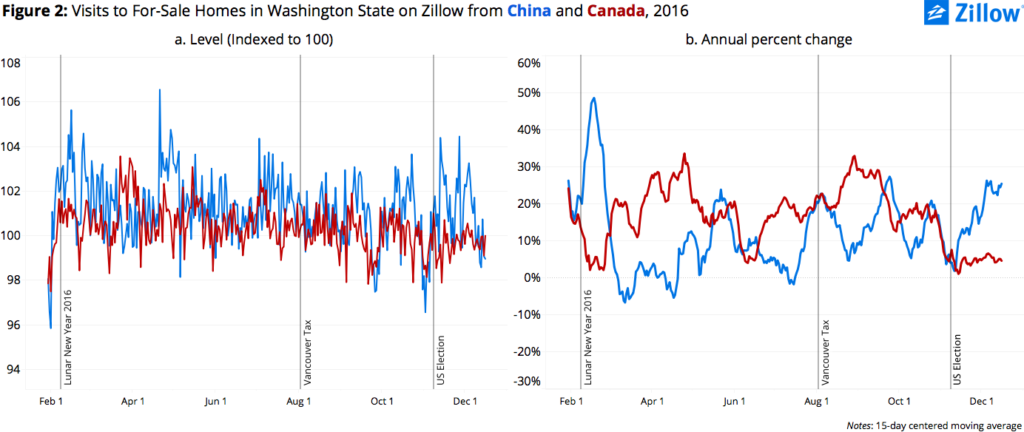Tax Relief: The (Non)Impact of Vancouver’s Real Estate Tax on the Seattle Market
In August 2016, the government of British Columbia, Canada, enacted a 15 percent tax on foreigners buying homes in the rapidly growing city of Vancouver. Most now agree that the Vancouver housing market has slowed substantially since last summer, but the data remain inconclusive as to any specific effects on international buyers of Vancouver homes. And there is less agreement on whether the tax has pushed would-be buyers of Canadian homes to instead consider U.S. homes south of the 49th parallel, especially in nearby Seattle.
In August 2016, the government of British Columbia, Canada, enacted a 15 percent tax on foreigners buying homes in the rapidly growing city of Vancouver. Most now agree that the Vancouver housing market has slowed substantially since last summer, but the data remain inconclusive as to any specific effects on international buyers of Vancouver homes. And there is less agreement on whether the tax has pushed would-be buyers of Canadian homes to instead consider U.S. homes south of the 49th parallel, especially in nearby Seattle.
Some predicted the tax may lead to a surge in demand for U.S. homes among Chinese buyers, in particular – a group particularly active in the Vancouver market prior to the enactment of the foreign buyer tax. Given the proximity of Seattle to Vancouver, it has been suggested that the Seattle market is particularly exposed to potential side effects of the Vancouver tax.
But while demand for U.S. real estate among Chinese nationals remains robust, an analysis of international home shoppers visiting Zillow.com suggest the Vancouver tax has not moved the needle much.[1]
First, we analyzed visits to homes nationwide listed for sale on Zillow.com from both the People’s Republic of China (PRC) and from Brazil. These two groups of home shoppers are similar in size, though very different in terms of where in the United States they tend to search for homes. Chinese visitors focus mostly on suburban enclaves around Los Angeles, San Francisco, Seattle, New York and Boston; Brazilians most often focus on homes in Florida. Brazilians have also not historically represented a significant portion of Vancouver home buyers.
Figure 1a shows the number of visits to for-sale homes nationwide on Zillow from shoppers in the PRC and Brazil, indexed to 100, over the course of 2016. Figure 1b shows the annual growth rate of visitors from each of these two countries. If the Vancouver tax had pushed Chinese shoppers toward the U.S. market, we should have seen a surge in the number of Chinese shoppers in the weeks after the Vancouver tax was enacted. Instead, the two level series track each other fairly closely.[2] The annual growth rate series shows a drop in Brazilian home shoppers, but steady (if somewhat volatile) growth in Chinese home shoppers from April through August.
We do notice a very sharp jump in Chinese home shoppers in the weeks immediately before and after Lunar New Year, historically a popular time of year for Chinese home shoppers considering homes in the United States.

In a second analysis, we compared site visits to homes listed for sale in just in the state of Washington and only from home shoppers in the PRC and Canada (figure 2). Canadian residents are, obviously, exempt from the Vancouver tax.[3] In the months after the enactment of the Vancouver tax, the number of Chinese visitors to home listings in Washington State grew slower than the number of Canadian visitors to Washington State listings, though still at a healthy double-digit pace.

The reality is that a number of West Coast markets – including Seattle, Los Angeles and the San Francisco Bay Area – have long been popular destinations for Chinese home shoppers in the United States. These shoppers are drawn by the combination of world-class educational institutions, historic Chinese-American communities and a ready-pool of Chinese-speaking real estate professionals, steady home value growth, and strong job prospects.
In addition, China announced new foreign exchange regulations in late 2016 limiting the value of foreign currency Chinese nationals can purchase in a given year. Though we do not yet see evidence that these new regulations have weighed on Chinese home shopping behaviors on Zillow, some Chinese brokers believe that the rules have limited interest in overseas properties among potential Chinese buyers.
Overall, while we do not doubt that interest in U.S. real estate among Chinese home shoppers continues to be robust, directly attributing this trend to decisions in Vancouver is, in our view, a stretch.
[1] Using internet traffic to assess economic activity admittedly poses a unique set of methodological and interpretive challenges, and we have voiced our own skepticism in the past around drawing strong, definitive conclusions based on search behaviors alone. In addition, there are unique challenges surrounding internet browsing behavior from China where language and the country’s sui generis internet policy shape online behavior. Nevertheless, the data are often suggestive of real trends, and can be useful when interpreted with caution.
[2] More formally, we conducted a statistical test, known as a Chow Breakpoint Test, which assesses whether or not the underlying trend of a series changes around a certain time. The test failed to provide statistically significant evidence of a structural shift in the series following the enactment of the Vancouver tax.
[3] The Vancouver tax initially applied to foreign nationals with Canadian work permits, though an exemption has since been enacted for these individuals.


